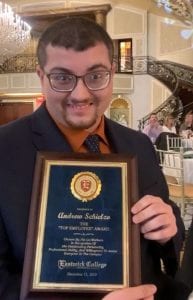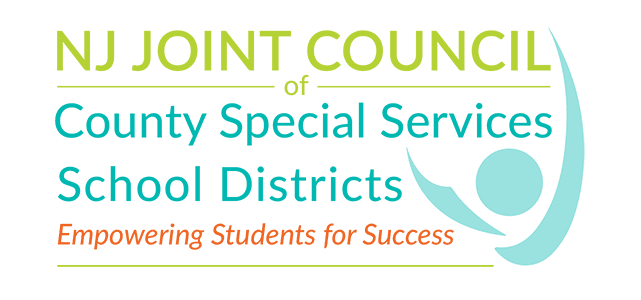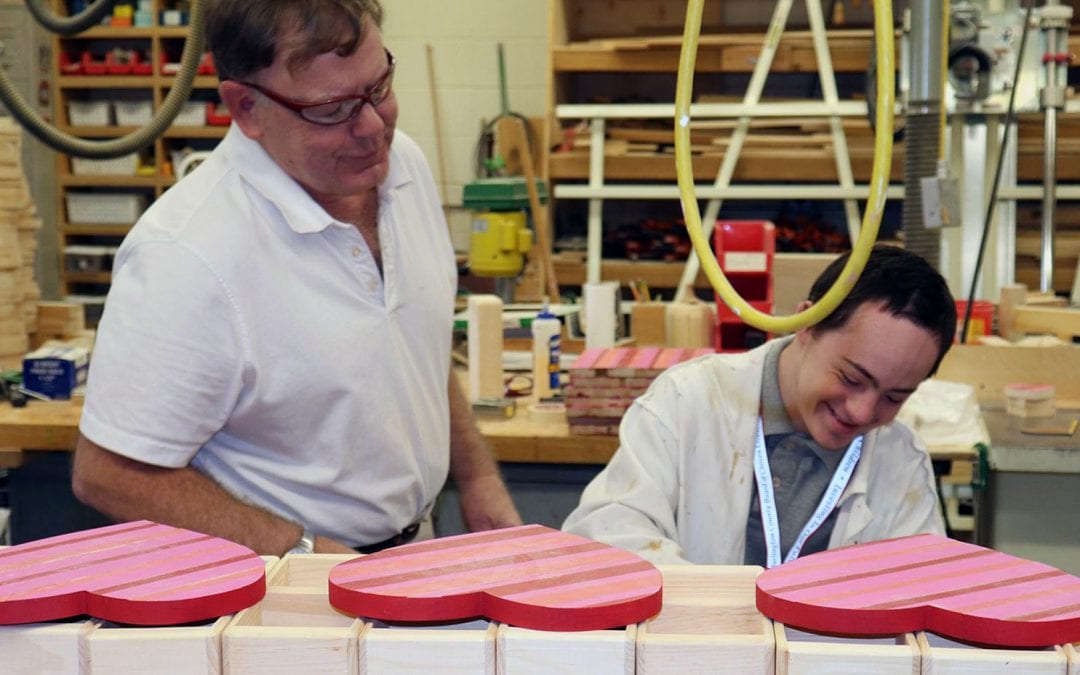A student takes advantage of one of the many career-focused learning spaces within Burlington County Special Services School District.
It may have been Alexander Graham Bell who famously said that “preparation is the key to success,” but these words are often echoed by educators within New Jersey’s county special services school districts. That’s because a large focus of the districts’ programming is preparing students with disabilities for their next steps in life. All involved realize that those next steps will vary from student to student, which is why every student has a specific plan for transition services as part of their Individualized Education Program.
February is Career and Technical Education (CTE) Month, which is an ideal time to explore how career transition services are integrated into the education of special needs students across the state. Programming may focus on practicing basic life skills and progress through on-the-job training in specific fields, even with supervised job placements leading to paid employment. The common goal across all transition programming, throughout all members of the New Jersey Joint Council of County Special Services School Districts, is to help each student achieve the highest level of independence.
Setting Students up to Succeed

Andrew S. from Bergen County Special Services School District’s Springboard Program displays his award for Eastwick College Hackensack Campus Employee of the Year.
Andrew S. found a perfect fit with Bergen County Special Services School District’s Springboard Program. The program, for ages 18-21, helps students through daily living instruction inside an actual house while also helping them develop social and vocational skills. Through the program, Andrew secured an internship with the Maintenance Department at Eastwick College in Hackensack. He performed so well that his responsibilities and hours increased, eventually leading to a paid position with the college. Andrew graduated from Springboard in June of 2019 and not only continued his job, but was even named the Eastwick College Hackensack Campus Employee of the Year.
“I’m bursting with pride,” said Dr. Howard Lerner, superintendent of Bergen County Special Services School District and chairman of the Joint Council. “Andrew is a wonderful example of how well our transition program can work. I’m proud of Andrew just like I’m proud of all our students, but it is really exciting to see them flourish not just while they’re in our program, but especially after they leave and venture into the world of work with the skills they’ve learned.”
Bergen County Special Services School District credits highly skilled and specialized educators and staff, and a good number of them, for helping students reach their full potential through district programming. “It’s not just our curriculum, but it’s the outstanding people we have and the resources we provide to support that curriculum that sets us apart,” “said Mitch Badiner, director of instruction.
While most transition programs are a three- or four-year program, The Cape May County Special Services School District realizes that not every student needs such a comprehensive program. So, starting this summer, they’ll offer a 13th year program, which is ideal for students who have met graduation requirements but continue to need additional support with occupational skill development and post secondary transition prior to graduating.
“It’s really about meeting the needs of our sending districts that have students who would benefit from an additional year of prevocational training and specialized transition services, similar to that of our community-based instruction program,” said Jamie Moscony, assistant superintendent of Cape May County Special Services School District. “Many of our sending districts do not offer community-based instruction programs, which provide job coaching and placement and transition planning.”
Mercer County Special Services School District’s Project ADULTS (Accessing, Developing, and Utilizing Life Transition Skills) similarly helps bridge the gap between school and adult life for students referred from public high schools, in addition to the district’s own students.
Real Life Lessons Taught in Real-World Settings
H.I.L.L.S House in Warren County has tailored its programming to also meet the needs of public districts in its region. The district welcomes its partner public school districts to bring students into its real-world classroom, which much like Bergen County’s Springboard Program, uses an actual house. Districts select a lesson they’d like their students to focus on at the H.I.L.L.S. House and can return for additional lessons throughout the year. The focus may be on practicing a task, such as how to make beds, do laundry, prepare meals and other household chores necessary to be independent. Students may even make a 911 call or order food. “We want them to learn as much as they can to offer the highest level of independence,” said H.I.L.L.S. House manager, Janet Cunningham. “We’ve gotten great feedback from parents who say that simple things, like bedmaking, now are done in minutes with ease rather than 45 minutes and a fight.”
Building confidence and giving students the soft skills needed to succeed is a major focus of all districts’ transition services. For those students who are ready, most districts then offer that additional layer of programming to focus on vocational development and workplace readiness.
“This program has taught me to have the right attitude,” said Teaghan Brabson, who is in her final year of Transitions at Burlington County Special Services School District. Teaghan currently has a paid job at WaWa, which she loves. “I’m hoping after this year, I will apply to other jobs and use my knowledge and job skills I’ve learned. I also learned to pay bills and banking. It’s given me skills to get my own place someday.”
Setting and Achieving Goals by Focusing on Fundamentals
Burlington County Special Services School District (BCSSSD) has a four-tier Transitions Program in place that is based on students’ individual interests, desires, and needs. More than 100 students are currently enrolled, including four who are successfully moving forward and going to college in September thanks to the preparation and skills learned in the “ACHIEVE” (Attitude and Commitment for Higher Education with Vocational Experience) tier of the program.
“The Transitions Campus has engaged in a process to promote student growth, development, and opportunity based on ability levels to learn workplace skills, potentially earn college credits, and have job placements in local businesses in paid and unpaid experiences,” said Dr. Chris Nagy, superintendent of BCSSSD. “Our efforts to focus on the potential migration across tiers in the Transitions Program affords all students the opportunity to maximize their potential and ready for the post age 21 transition.”
The Gloucester County Special Services School District has customized areas within its schools where students practice job skills. Like at other county special services school districts, Gloucester County students operate an in-school convenience store where things like sandwiches, soups, coffee, and other items are made and sold by the students. More unique spaces include a loading dock classroom, where packages of different sizes and shapes are sent down conveyor belts to students who need to pick up and load them onto palates, a valuable skill for those interested in getting a job with the county’s largest employer, Amazon, which opened a fulfillment center nearby in 2018. “They’re hiring a lot of young adults with special needs,” said Ron Rutter, principal and director of special education of the Bankbridge Schools. “The New Jersey Division of Vocational Rehabilitation Services works directly with Amazon, and they’ve given us a real leg up on everyone else when it comes to preparing these young adults for a job there.”
All eight county special services school districts in the state have strong community partnerships, which are instrumental in students learning real-world job responsibilities and expectations. The community-based instruction allows students to practice some of the “soft skills” they learned in the classroom, like how to say, “How can I help you?” and “please and thank you,” along with things like coin identification and how to count change. Most districts employ job coaches and mentors to help the students and offer guidance in the field.
Last summer, Atlantic County Special Services School District was fortunate to receive a paid summer internship grant from the New Jersey Department of Labor, which allowed 25 students between the ages of 16 and 21 to secure a paid summer job. Like the district’s school-year program, mentors, educational job coaches, and teachers supported the young adults who earned minimum wage for working 4 hours a day, 5 days a week, for 6 weeks. “It was huge for them,” said Anne Finley, vocational transition supervisor for Atlantic County Special Services School District. “They were so proud. It was very empowering and a real confidence builder. It was a great program for the children and really taught them responsibility. It wasn’t like missing school for the day; they knew if they weren’t there, the boss wouldn’t have anyone to do that job. It also helped bring classroom lessons about budgeting and saving money to life.”
Helping Bridge the Gap Between School and Work
Transportation is a big piece of the puzzle for most districts integrating job training and coaching into their programming, and it’s something that Salem County Special Services School District has gotten a handle on. The district serves rural Salem County as well as students from Cumberland County. It relies on four vans dedicated to the transition program and job coaches who all have commercial driver’s licenses ( CDLs) to get students out in the community for education and internships. “Transportation is key,” said Jim Helder, principal of the Salem County Campus of the Salem County Special Services School District. “We always try to find internships closer to where each student lives, which may be quite far from our campus. But, our hope is that we’ll set them up for work when they’re done with the program. We have had several students offered paid positions, and it’s been great for them and the employer. Instead of having to hire someone new off the street and teach them the job, they have these young adults who have already gone through the training process and can really step right in and do what they need them to do.”
Throughout the state, transition programs run by county special services school districts are empowering students with special needs while also helping employers see first-hand that these individuals can be excellent job candidates. “When you give them a chance, they’ll actually be the best employees hired in most cases,” said Atlantic County’s Finley. “We’re also changing people’s minds about the jobs that people with disabilities can do in the bigger world of employment.”

